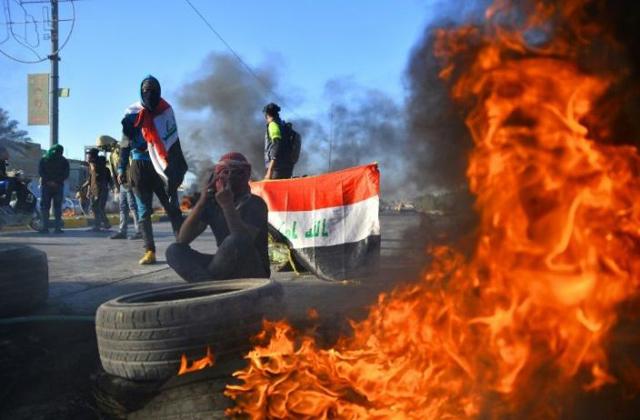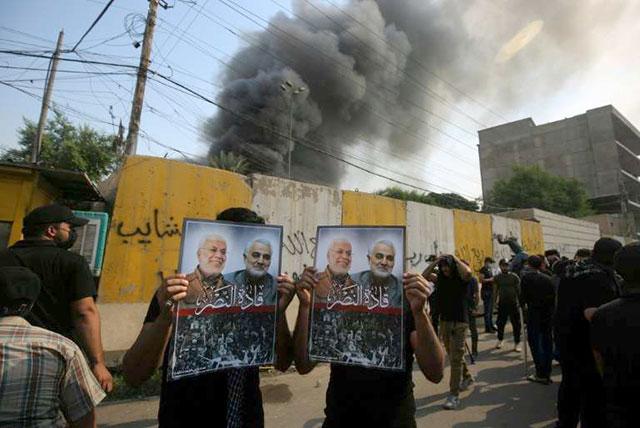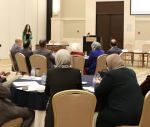You are here
Iraqi troops secure US embassy after attack
By AFP - Jan 03,2020 - Last updated at Jan 03,2020

Supporters and members of the Hashed Al Shaabi paramilitary force try to scale a wall of the US embassy in the Iraqi capital Baghdad on Wednesday (AFP photo)
BAGHDAD — Elite Iraqi troops deployed to secure the US embassy on Thursday, a day after a pro-Iran mob laid siege to it in dramatic scenes that overshadowed months of anti-government grassroots protests.
The unprecedented attack on the American mission in Baghdad — in which intruders threw rocks, laid fires and graffitied walls — sparked fears of a wider proxy war between Iran and the United States, both of them close allies of Iraq.
Supporters of Iraq's powerful Hashed Al Shaabi military force laid siege to the embassy in outrage at US air strikes that killed 25 of their fighters, but pulled back on Wednesday after an order from the group.
On Thursday, more than a dozen black armoured vehicles of the US-trained Iraqi counterterrorism service deployed on the embassy’s streets in the capital’s Green Zone to reinforce security there.
Pro-Iran slogans still covered the entire length of the thick concrete walls breached by the mob.
But the Hashed flags planted by protesters on the embassy’s outer walls, as well as photographs of the killed fighters put up in mourning, had been cleared away according to an AFP correspondent.
Embassy staff could be seen cleaning up a reception area the protesters had broken into and torched, and cranes were used to move rocks and debris they had pelted at the embassy.
The attack sparked comparisons with the 1979 hostage crisis at the US embassy in Tehran and the deadly 2012 attack on the US consulate in Libya’s second city Benghazi.
The Pentagon warned that the Iran-backed group that stormed the embassy would carry out more attacks on US facilities — and would regret it.
“The provocative behaviour has been out there for months,” said US Defence Secretary Mark Esper.
“So, do I think they may do something? Yes. And they will likely regret it.”
“We are prepared to exercise self-defence, and we are prepared to deter further bad behaviour from these groups, all of which are sponsored, directed and resourced by Iran.”
‘We’re still here’
The violence has also troubled Iraqis who have taken to the streets since October in massive rallies denouncing government corruption, a lack of jobs and poor public services.
The largest grassroots protests Iraq in decades has seen tens of thousands flooding the streets across the capital and Shiite-majority south.
Nearly 460 people have been killed and around 25,000 wounded in protest-related violence.
Demonstrators have worried that the dramatic developments outside the US embassy would either steal their thunder or be mistaken for an extension of their own movement.
“What happened in front of the US embassy was an attempt to draw people’s eyes away from the popular protests now in their fourth month,” said Ahmed Mohammad Ali, a student protester in the southern hotspot city of Nasiriyah.
“We’re still here, protesting for change and hoping for victory,” he told AFP.
Ali’s determination came despite the attempted killings of two activists in Nasiriyah overnight, both of whom survived.
An activist in Baghdad was not so fortunate: Saadoun Al Luhaybi was shot in the head in a south-western neighbourhood of the capital overnight, a police source told AFP on Thursday.
Around a dozen activists have died in targeted killings across Iraq in what demonstrators say is an intimidation campaign meant to scare them into halting their movement.
Many have persisted, and rallies rocked the southern city of Diwaniyah on Thursday.
Protesters there have shut most government offices but briefly allowed some to reopen this week to allow employees receive their end-of-year salaries.
New rules of the game
The attack on the embassy highlighted new strains in the US-Iraqi relationship, which officials from both countries have described to AFP as the “coldest” in years.
The United States led the 2003 invasion against then-dictator Saddam Hussein and has worked closely with Iraqi officials since.
But its influence has waned compared with that of Tehran, which has long and carefully crafted personal ties with Iraqi politicians and armed factions, even during Saddam’s reign.
Both Washington and Tehran backed Iraqi security forces fighting the Daesh terror group, but the two have been at loggerheads since the United States pulled out of the landmark nuclear deal with Iran in 2018.
Iraqi officials have feared that their country could be used as an arena for score-settling between Iran and the US.
“Before this episode, there was an agreement that in post-Daesh Iraq, the US and Iran don’t attack each other directly,” said Renad Mansour, an expert at the London-based Chatham House.
“That norm is being challenged now because Iran and its allies are in a bad spot. That is very destabilising, because they will seek to change the status quo.”
Related Articles
DIWANIYAH, Iraq — Iraqi protesters flooded the streets on Sunday to denounce both Iran and the US as "occupiers", angry that fears of war be
BAGHDAD — Some 2,000 supporters of Iraq's pro-Iran Hashed Al Shaabi network protested on Friday in Baghdad against alleged fraud at last mon
BAGHDAD(AFP)--Hundreds of Hashed demonstrators swept past a security detail and stormed into the offices of the Kurdistan Democratic Party (


















